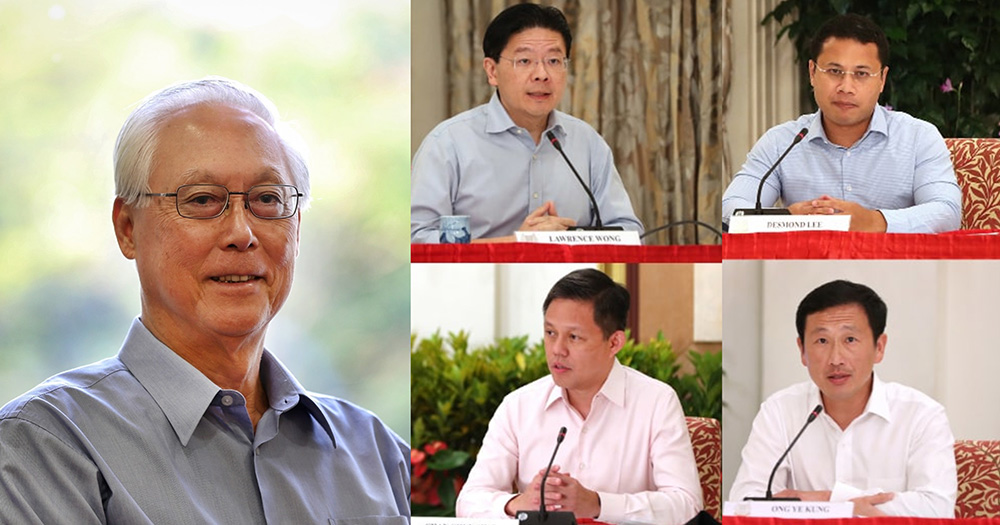"To my fellow Singaporeans: Give the 4G team some time to decide on their primus inter pares (first among equals)", Emeritus Senior Minister (ESM) Goh Chok Tong said in a speech on May 7.
Speaking at the official launch of the second volume of his biography, "Standing Tall: The Goh Chok Tong years", published by World Scientific, Goh highlighted that there had also been hiccups during the transition from the Old Guard to the 2G leaders.
In adding that the process of an orderly political transition was continuing, he commended Deputy Prime Minister Heng Swee Keat for his "self-sacrifice" in stepping aside as the leader of 4G and added:
"It takes courage and selflessness to do this when one is only a step away from being Prime Minister. He (Heng) has put the interests of Singapore first, like a good leader should."
Political succession is not an internal PAP problem but a national issue
This brought up Goh's next point that political succession is not an internal PAP problem but a national issue.
In stressing that Singapore needed "people of ability and integrity", he called on Singaporeans to give the 4G team "some time" to decide their leader.
Here, Goh likened the role of the 4G leader to the captain of a soccer team, noting that they will have to work together to produce the best results for Singaporeans, "just as a soccer team has to click to win matches for its fans."
Goh also called on the 4G ministers to continue working closely as a team, and demonstrate confidence and leadership as a group.
He elaborated:
"Hone your political skills and prepare yourselves to take over the reins from the 3G. Deliberate carefully who amongst you should be the leader, and band together to support the leader once a decision is made."
Carefully, managed political succession is the hallmark of independent Singapore
Goh also highlighted that a carefully managed political succession has been the hallmark of Singapore since its independence as it has given the country, political stability, predictability and good governments.
Here, Goh drew an example from his experience of studying Development Economics in Williams College, USA, in 1966.
In noting that the class of 20 came from 16 different countries, Goh added that he had tracked the fortunes of his classmates through the fate of their countries.
Some, such as Yugoslavia, broke apart into smaller states, while others, such as the Philippines, Egypt and Liberia, were convulsed by revolutions and violence, he said.
Still others, such as Kenya, Uganda and Colombia, had a patchy performance, while Malaysia, India and Mexico have done relatively well.
However, out of the 16 countries, only Singapore became an advanced high-income country, he noted.
This brought up what Goh saw as the primary lesson of his biography, that the future of a country depends on its leaders.
Good leaders are absolutely critical for a city-state like Singapore
Turning to the wider implications for the country, Goh pointed out that given Singapore's status as a city-state, its fall will be far more "precipitous" than its rise should there be a lack of good leaders or support for them.
Highlighting that their presence was not dependent on democratic norms, he said:
"I do not believe that good leaders will automatically emerge in a democracy nor that the whims of elections can guarantee a slate of the best to govern the country. For democracy to work, ours anyway, we must offer the best candidates possible for the people to choose."
As such, the PAP "scours" the country for a diverse slate of candidate, seeking not to perpetuate the party itself, but good governance, values, institutions and practices.
In emphasising the impact of leader, Goh explained that such people bring good governance, which in turn bring about a stable and conducive environment for people to grow and succeed.
In addition, they must also have the following attribute which Goh termed the five "I"s: Integrity, Iron, Intelligence; and be Inspiring and Impactful.
Worked well with Cabinet colleagues, including Ong Teng Cheong
Goh then concluded his speech by thanking his own colleagues such as Tony Tan, S Jayakumar, Wong Kan Seng, S Dhanabalan, Ong Teng Cheong and Prime Minister Lee Hsien Loong among others.
Goh also specifically singled out the late former President Ong, whom he thanked as an "invaluable member of my team."
Highlighting their cordial relations, Goh said that he enjoyed a "good camaraderie" with Ong and had regular Pre-Cabinet meetings and lunches with him.
Such warm relations allowed both of them to discuss and debate issues frankly and thoroughly, "often with some good-natured bantering".
Both of them might also have differing points of view but once a decision was made, Goh added, they would all rally behind it.
In summing up their relationship, Goh said:
"We trusted each other. We worked as a team, with members looking out for one another. We had a shared sense of purpose. We were united. Without this team, I would not have succeeded as Prime Minister. Nor would Singapore have grown and flourished."
Lastly, Goh thank PM Lee for being "an indispensable member of my Cabinet", urging him to write the sequel to his story and to the Singapore Story of Lee Kuan Yew.
Left photo from MParader Facebook and right photo from Gov.sg
If you like what you read, follow us on Facebook, Instagram, Twitter and Telegram to get the latest updates.
